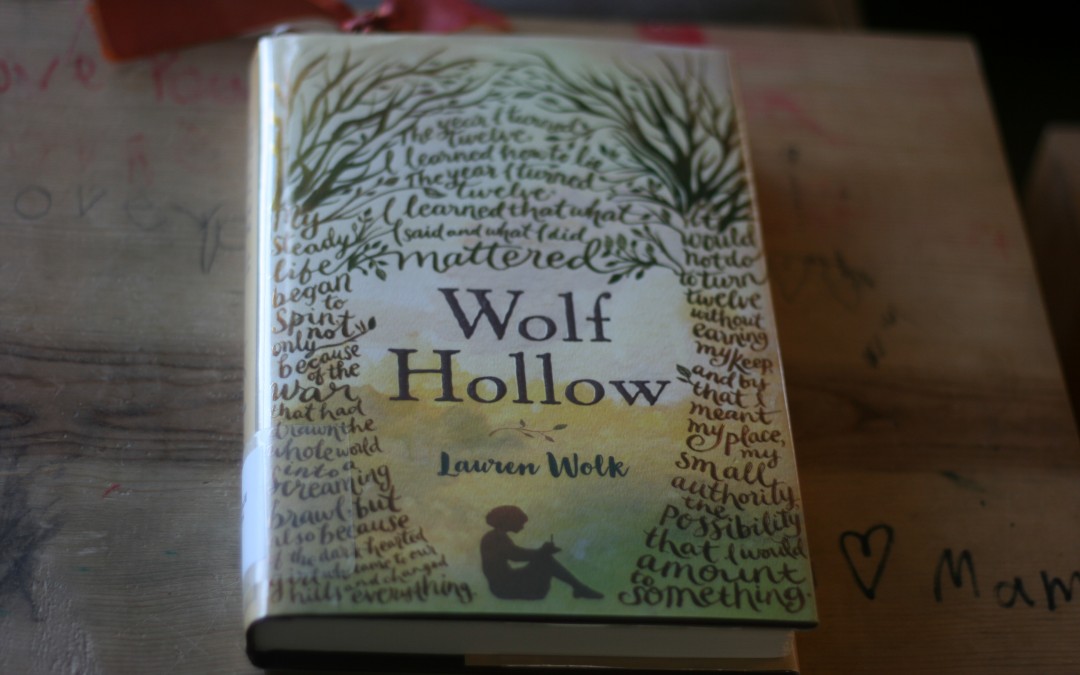
by Rachel Toalson | Books
Today I want to introduce you to two middle grade reads that felt a bit old—but in entirely different ways.
Wolf Hollow, by Lauren Wolk follows the story of Annabelle, who lives on a farm. Unlike many of her classmates, Annabelle’s family has done well after World War I. She has enough to eat, enough time to play, enough love to go around. And then in walks a new girl, Betty, who begins targeting Annabelle with her bullying pranks, some of which are quite dangerous. Betty quickly turns her bullying efforts to Toby, a World War I veteran who lives in a small shack in the woods. He is the kind of guy most people tolerate but don’t understand. Annabelle, however, loves him as a child would love an uncle—which is good, because she will have to find the courage to stand up for him and risk everything to clear his name when Betty mysteriously disappears.
Not only was Wolf Hollow a bit long for a middle grade read but it was also written in a way that, to me, felt almost like reading an adult memoir. Bullying is a deep topic. We absolutely need to talk about it with our kids. They need to read about it in stories. But there was something about the way the topic was presented in this book that felt a little mature to me. It was a great read, but I think it could have been classified better, if someone had taken the to unravel all the layers. It felt more like an adult book to me. Just because the narrator is a 12-year-old girl doesn’t mean that it should be classified middle grade fiction.
I am all for dark middle grade literature that explores hard topics like abuse and bullying and parental divorce and growing up. But Wolf Hollow felt a little too old to me. I think it had something to do with how the narrator saw the world. It seemed as though she was an adult, looking back on this one particular time in her life.
So now that I’ve gotten that detail out of the way, I’ll say that I really enjoyed the story. Not only did it showcase bullying, but it detailed what veterans struggle with once they are done with a war. It was intriguing and heart-wrenching and, at times, sobering. The story pulled you in and would not let you go. Annabelle had extraordinary bravery and dedication. She defied her parents to do what was right, what would protect someone she loved in the safest way. The tension throughout the book kept me engaged and hopeful.
Now that I look back on it, I can tell by the first line that the book was a bit old for middle grade, even the upper ages:
“The year I turned twelve, I learned how to lie.
“I don’t mean the small fibs that children tell. I mean real lies fed by real fears—things I said and did that took me out of the life I’d always known and put me down hard into a new one.”
So, if you read Wolf Hollow, just keep this mis-classification in mind. I think you’ll enjoy it much better.
The Black Pearl, by Scott O’Dell, is another middle grade book that feels old, but in a completely different way. I read this one aloud to my boys, and they were riveted the whole time. It felt old, because O’Dell was a popular writer back in the ‘80s and ‘90s, and literature was much different than it is now.
It’s refreshing to read his books again. I read them all when I was younger, breezed through the whole shelf of my middle school library, because I loved his stories so much. He’s written all sorts of Newbery Honor books, including Island of the Blue Dolphins, which was the first O’Dell book I ever read, Sing Down the Moon (also a fantastic one) and this one.
The Black Pearl is about a pearl merchant family. Ramon Salazar has never been allowed to dive for the pearls, though his father is a pearl dealer. His father believes it’s too dangerous. So when his father embarks on a journey, Ramon defies his father’s wishes and dives in a small area that is known to house a great sea beast—the Manta Diablo, who guards the Pearl of Heaven. But Ramon comes back with the Pearl of Heaven, and he thinks it’s the saving grace of his community—until the old man whose lagoon houses El Diablo tells him that the manta will get his pearl back one way or another.
It’s a dark, adventurous tale that will keep you wondering how, exactly, the Manta Diablo will exact his revenge.
Like I said, this story is written very differently than the stories you see today. It’s not as fast-paced and visual, but it still is a story that stands the test of time. My boys could not wait to hear what happened next—which proves, to me, that all you really need is an engaging character and a good story. A book can have the best visual writing around, but if it does not have a solid story, it will fall flat.
Be sure to visit my recommendation page to see some of my best book recommendations. If you have any books you recently read that you think I’d enjoy, get in touch. And, if you’re looking for some new books to read, stop by my starter library, where you can get a handful of my books for free.
*The books mentioned above have affiliate links attached to them, which means I’ll get a small kick-back if you click on them and purchase. But I only recommend books I enjoy reading myself. Actually, I don’t even talk about books I didn’t enjoy. I’d rather forget I ever wasted time reading them.
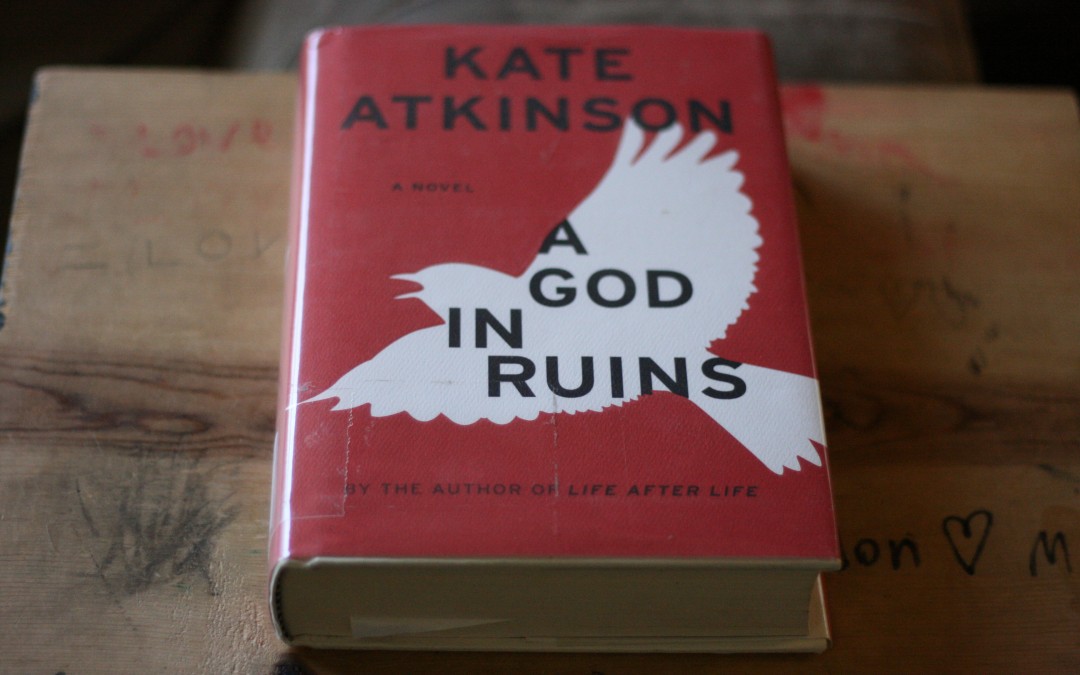
by Rachel Toalson | Books
I recently finished two adult literary novels that will probably disturb you a bit—because that’s exactly what they did to me.
A God in Ruins, by Kate Atkinson, is the sequel to Atkinson’s 2014 masterpiece, Life After Life. A God in Ruins follows the story of Teddy, who is the sister of the heroine in Life After Life. In Life After Life, it seems as though Teddy has been killed in World War I, but in A God in Ruins, Teddy is alive and well, creating his own sad life. The book follows a very non-linear path but always has Teddy at the heart of it. He is a war hero and has come home to begin a family of his own.
A God in Ruins follows the meandering path of Teddy’s life, marriage, children, grandchildren and, eventually, death. Teddy never expected to live after the war, but he did, and throughout his living, he struggles to make it a good life. It was an epic story about love, family and what happens when a good man is given a second chance at life.
Atkinson did a fantastic job highlighting the difference between generations by showing thoughts and beliefs from Teddy and his wife; Teddy’s daughter, Viola; and his grandchildren Sunny and Bertie. This was probably my absolute favorite feature of the book. Atkinson skipped through viewpoints so that readers could experience life from all the different generations. I found it fascinating. Viola and her husband were hippie-types, while Teddy and his wife were the more conservative type that was typical of the World War I generation. And his grandchildren were bearing the scars from all the neuroses of the previous generations and believing, sometimes naively, that they’d be able to do better. I thought it was an accurate portrayal of the world’s generations today.
Though it was long and, at times, a little meandering, I enjoyed A God in Ruins. And the end has a twist that will likely surprise you.
I initially picked up I’m Thinking of Ending Things, by Iain Reid, because of its intriguing cover. I thought it looked promising, and it definitely delivered. This book was a fantastic literary thriller that I could not put down. It’s a small book, only about 62,000 words, and it definitely went quick. But it was fantastic all the way through it.
I don’t want to give to much away in my summary, so I’ll just say that the book is about a woman taking a trip with her boyfriend, considering the entire drive whether or not she should end things with him. The significance of all her conversations and rumination will come crashing in once you reach the end of the story.
There were so many things I liked about this book. Probably one of the most significant, at least for me, was the length. I love when adult books are short, because I don’t have a whole lot of time to read an epic book, and most of the time, when I do read a 700-pager, I usually reach the end thinking that what it needed was a good editor. Long doesn’t necessarily mean better. I’ll just throw that out there.
Reid is a master at communicating only enough of what you need to know.
I also loved that as the story progressed, so did my sense of unease and dread. I knew something bad was going to happen, but it was little subtle clues that unfolded it for me. Reid wasn’t obvious in any way. I thought I’d guessed something, and then he’d twist it around. I second guessed myself. I second guessed the characters. That’s when you know it’s a good thriller.
One of the other aspects of the book that I really enjoyed was that every now and then the narrator would philosophize on family and relationships and death—the deep things. It made for interesting breaks from the increasing sense of dread.
As soon as I was done with this one, I put it on Husband’s to-read shelf, because I knew he would enjoy it. It’s one of those books that’s like a seed. It will sit inside you for a while, and it will take a while to unfold and bloom, but when it does, watch out. You’ll be looking at everybody differently.
Here’s the opening of the book. (You’ll have to go out and read it now—how could you not?)
“I’m thinking of ending things.
“Once this thought arrives, it stays. It sticks. It lingers. It dominates. There’s not much I can do about it. It doesn’t go away. It’s there whether I like it or not. It’s there when I eat. When I go to bed. It’s there when I sleep. It’s there when I wake up. It’s always there. Always.”
And here’s one of my favorite philosophical asides:
“I think what I want is for someone to know me. Really know me. Know me better than anyone else and maybe even me. Isn’t that why we commit to another? It’s not for sex. If it were for sex, we wouldn’t marry one person. We’d just keep finding new partners. We commit for many reasons, I know, but the more I think about it, the more I think long-term relationships are for getting to know someone. I want someone to know me, really know me, almost like that person could get into my head. What would that feel like? To have access, to know what it’s like in someone else’s head. To rely on someone else, have him rely on you. That’s not a biological connection like the one between parents and children. This kind of relationship would be chosen. It would be something cooler, harder to achieve than one built on biology and shared genetics.
“I think that’s it. Maybe that’s how we know when a relationship is real. When someone else previously unconnected to us knows us in a way we never thought or believed possible.”
I hope you enjoyed these book recommendations. Be sure to pick up a free book from my starter library and visit my recommends page to see some of my favorite books. If you have any books you recently read that you think I’d enjoy, contact me. I always enjoy adding to my list. Even if I never get through it all.
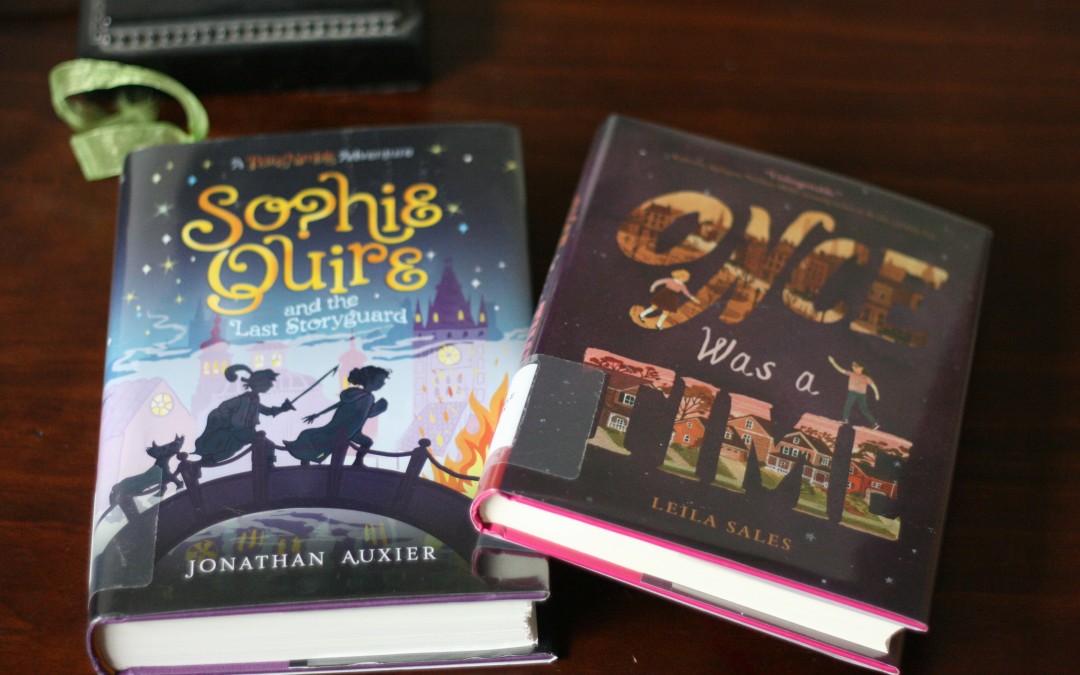
by Rachel Toalson | Books
Every now and then, I come upon middle grade stories that are so magical and adventurous I can’t wait to share them with my boys—even if they have girl protagonists at their heart and center.
Once Was a Time, by Leila Sales, is a story about time travel. Charlotte’s Bromley is separated from her best friend of all time, Kitty, when she jumps into a portal and time travels seventy years forward. Her story initially begins in the middle of World War I, when her father is captured because someone is trying to figure out how to use time portals, and he’s the only one who knows. Charlotte and her best friend attempt a rescue and find themselves in danger. Charlotte is the only one who makes it through the time portal.
She travels to a completely different town and is adopted by a family, becomes friends with some popular girls at her school, all because of her British accent, and tries to adjust to the reality in which she finds herself. But she can’t forget Kitty.
So she embarks on an adventure to find her best friend, following clues that may not be clues at all and, in the process, coming to terms with a present that she might not have ever wanted.
Once Was a Time was such a sweet story of love and friendship and the ties that bind even across many years and cultures. I’ve noticed that in a lot of middle grade fiction, romance has begun to creep in. But this story was so innocent and focused only on friendship. Charlotte was faced with a decision about who she wanted to befriend in her new school—the popular girls or the boy everybody called weird? She faced all sorts of obstacles in finding Kitty again—but love would not let her give up.
Everything about this story—from the time travel aspect to the themes of love and friendship and kindness—was lovely and sweet.
Sophie Quire and the Last Storyguard, by Jonathan Auxier, was a book I’ve been anticipating since it released. I’ve become a superfan of Jonathan Auxier, having read both The Night Gardener and Peter Nimble and His Fantastic Eyes. I knew that I would like this one, and I was not disappointed.
Sophie Quire is a bookbinder in the city of Bustleburgh, working at her father’s shop, Quire and Quire. She happens upon a mysterious book, called The Book of Who. From this, she figures out there are three other books—The Book of Why, the Book of When and the Book of What. She and Peter Nimble, who is the greatest thief in the history of time, set off on an adventure to find the other ancient books and protect them from the book burning that’s happening in Bustleburgh because the powers that be want to rid the city of nonsense (Sound a little Fahrenheit 451-ish? It was one of the books that inspired Sophie Quire, Auxier says in his author’s note.).
The story is full of magic and adventure and fascinating descriptions that bring the imaginary world of Bustleburgh and the lands beyond it fully and thoroughly alive.
Sophie Quire was such a well-thought-out tale, which is what I’ve come to expect from Auxier. One of my favorite things about the book was that it was broken up into four distinct parts—Who, What, When and Why. Each part, of course, had to do with Peter and Sophie trying to obtain the book with the same question in its name. It made for a very linear structure.
One of my other favorite elements of the book was the voice of the narrator. Sophie Quire was told in omniscient point of view, which, if you’ve been around for a while, you know that I absolutely love. I enjoy hearing the voice of the narrator in certain tales, especially magical adventures (for another great narrator-told tale, check out Christopher Healy’s Hero’s Guide books. They’re hilarious.). This narrator was at times humorous, mysterious and wise.
Something else I really enjoyed about this tale was that Auxier included a lengthy author’s note, in which he listed some of his influences when writing Sophie Quire. It’s always interesting to me to see what sorts of things writers use to make their stories better and also what inspired them to dream up the story in the fist place. His author’s note included several titles that I’ve added to my reading list.
And the last thing I really loved about this book was its beginning and its end. Auxier is a master of drawing readers immediately into the story and then sending them out with a bit of hope.
Here’s the opening of Sophie Quire:
“It has often been said that one should never judge a book by its cover. As any serious reader can tell you, this is terrible advice. Serious readers know the singular pleasure of handling a well-made book—the heft and texture of the case, the rasp of the spine as you lift the cover, the sweet, dusty aroma of yellowed pages as they pass between your fingers. A book is more than a vessel for ideas; It is a living thing in need of love, warmth, and protection.”
This is probably one of my favorite first lines ever.
And this is probably one of my favorite closing lines ever:
“I would like to tell you that Quire & Quire remains open to this day, but that would be untrue. The shop closed eventually, and its marvelous talking books soon made their way to other lands and other readers. Most of these books have grown shy in their old age, preferring to sit quietly on the shelf. But if ever you find a very dusty book on a very-out-of-the-way bookcase, put it to your ear and listen closely. What do you hear? The faint rustle of pages, the creak of an old spine, and the hushed song of a story waiting to be read.”
Be sure to visit my recommendation page to see some of my best book recommendations. If you have any books you recently read that you think I’d enjoy, get in touch. And, if you’re looking for some new books to read, stop by my starter library, where you can get a handful of my books for free.
*The books mentioned above have affiliate links attached to them, which means I’ll get a small kick-back if you click on them and purchase. But I only recommend books I enjoy reading myself. Actually, I don’t even talk about books I didn’t enjoy. I’d rather forget I ever wasted time reading them.
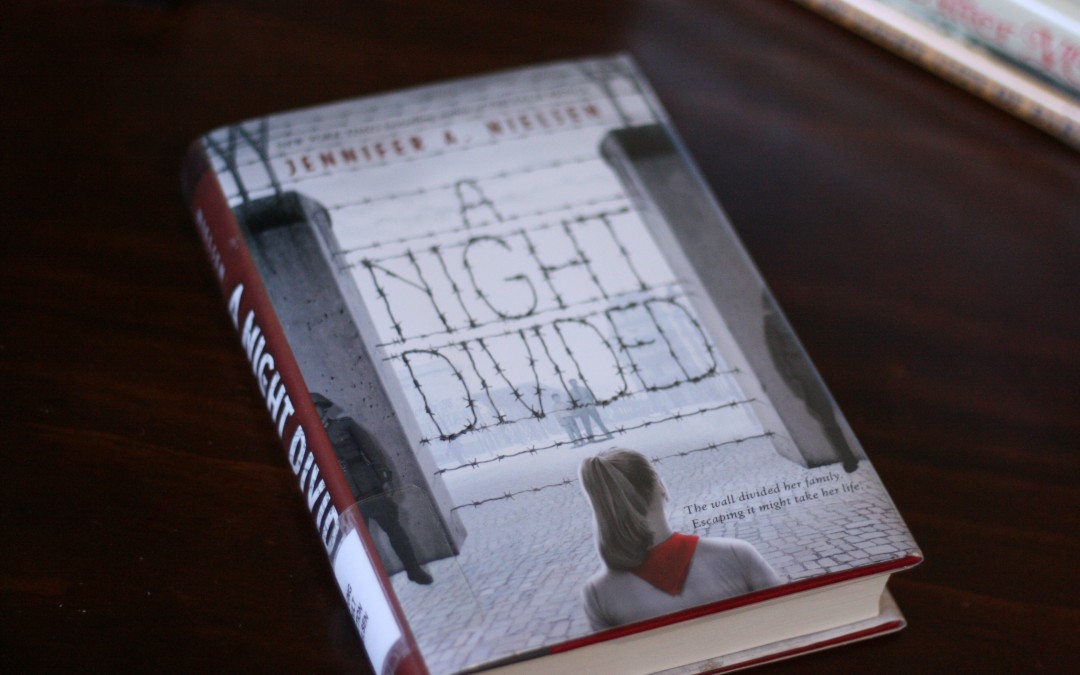
by Rachel Toalson | Books
Emmy & Oliver, by Robin Fenway, was a sweet love story about two kids, Emmy and Oliver, who grew up together but were separated when Oliver’s dad stole him from school grounds as an elementary school kid. Emmy didn’t see Oliver for ten years, and then, suddenly, he came back.
The premise of this novel was intriguing. That Oliver’s father could have gotten away with taking his son and hiding him for ten years was a little disturbing and yet made the book that much sweeter, because during all that time, Emmy had never stopped loving Oliver. Now they’re in high school, and Oliver is back, and he has to get used to interacting with the best friends he had forgotten in the decade he was gone from them. He has to adjust to his mother’s new family. He has to get to know Emmy all over again.
There was so much tension in this novel, because while Oliver is adjusting, everyone else remembers him. Their town was never the same after he was taken, so how could they forget? All the kids’ parents cracked down on their safety. Emmy’s parents became practically glued to her hip. They don’t even want her to go off to college because they want to keep her in their sights.
Emmy, though, wants to be in charge of her own life and has some secrets she’s been keeping from her parents.
Added to that was also the tension of Emmy’s love and Oliver’s confusion. While she loved him all those years he was gone, he seems to have forgotten the connection they’d had when they were in elementary school. This makes her feel a bit foolish.
Throughout the book, Benway strategically placed some flashbacks that told the story of when Emmy and Oliver met and also what their relationship was like as children. I found the flashbacks a masterful contribution to the sweet emotion of the book.
I loved everything about this story. There was so much emotion, so much teenage angst, so much tension between teens and their parents, and yet, it was refreshing that the teenagers had mostly good relationships with their parents. But most of all I loved the relationship between Emmy and Oliver. It endured through all the waiting and hoping, even when everyone in Emmy’s town thought Oliver would never be found. Still she loved him.
Here’s a quote that shows the constant tension between Emmy and Oliver and the love they’re trying to remember:
“The more you start to love someone, the more you ache when they’re gone, and maybe it’s that middle ground that hurts the most, when you can see them and still not feel like you’re near enough.”
A Night Divided, by Jennifer Nielson, was a historical young adult novel set during the time of the Berlin Wall’s construction. Greta and her brother, Fritz, along with their mom, are stuck in East Germany, with their father and younger brother in West Germany, because the Berlin Wall went up seemingly overnight. One day, on the way to school, Gerta sees her father on the other side of the wall. She’s not allowed to look at the wall for all that long, or the secret police will tag her as a traitor. And traitors could be killed. But it seems that her father wants to tell her something.
It takes Gerta a while to figure out what he wants to say, but she and her brother embark on a mission to escape from East Germany, even while neighbors and friends are turning names over to the secret police and people are being killed for their attempted escapes. Nothing deters them. Not only do they want to escape East Germany, but they are driven by their desperation to reunite with the rest of their family.
A Night Divided contained a lot of tension as well because it dealt with a wall dividing a country. What I loved most about the book was that it was based on a historical event and contained quite a bit of fact about the Berlin Wall and the situations that cropped up because of it. Nielson did a great job highlighting a part of our history and bringing it to life for young adults.
I love this description of Gerta’s family after the wall goes up:
“Our family was like a house of cards in a stiff wind. And when it became too much to feel the pain of our collapse, all I could do was become angry.”
And here was one of my favorite quotes that shows the history contained in the novel:
“I wanted books that weren’t censored. I wanted to see places that were now only pictures in the smuggled magazines that had passed though my hands. Places like the canals of Venice, or the beaches in the South of France, or maybe even one day the Statue of Liberty in the United States.
“I wanted a home without hidden microphones, and fiends and neighbors I could talk to without wondering gif they would repot me to the secret police.
“And I wanted control over my own life, the chance to succeed. Maybe I would fail, but if I did, it shouldn’t be because some Stasi official holding my file had made that decision for me.”
Both of these books were fantastic, entertaining reads that will stick with you for a long time.
I hope you enjoyed these book recommendations. Be sure to pick up a free book from my starter library and visit my recommends page to see some of my favorite books. If you have any books you recently read that you think I’d enjoy, contact me. I always enjoy adding to my list. Even if I never get through it all.
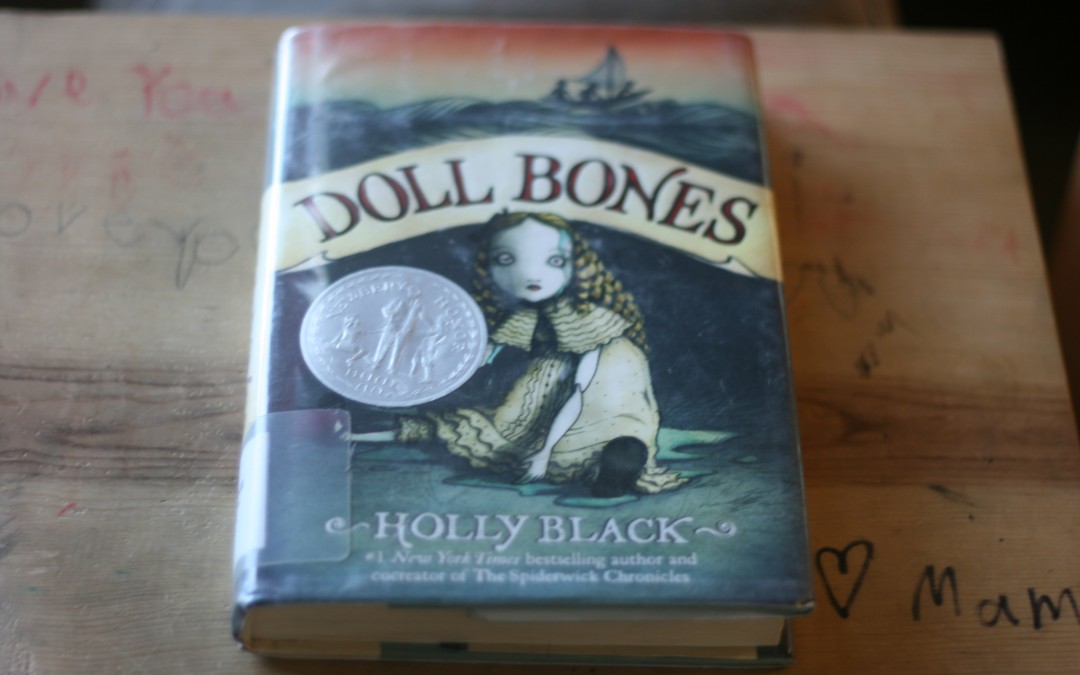
by Rachel Toalson | Books
I feel like I’m probably going to gush at some point during this blog. Doll Bones, by Holly Black, was one of the best creepy middle grade books I’ve read lately, right up there with Jonathan Auxier’s The Night Gardener. I have a very overactive imagination when it comes to creepy things, so middle grade creepiness is about the highest form of creepiness I can take. Doll Bones was perfect—Holly Black filled in just enough of the details and then left the rest to kids’ imaginations, which is really the best kind of horror fiction.
Doll Bones follows the story of Zach, Poppy and Alice, who are the kind of friends who play pretend. It opens on a scene where they’re playing with dolls and action figures, creating a whole new fantasy world that has pirates and warriors and a Great Queen, which is the bone china doll Poppy’s mother keeps hidden behind a cabinet. She rules over all the lands and is creepy, creepy, creepy.
They’re all in middle school now, so Zach’s father, thinking his son is too old to play pretend with a bunch of girls, throws all Zach’s action figures in the trash while he’s away at school. So Zach has to stop playing with Poppy and Alice, but he doesn’t tell them why. Just when their relationship is starting to fray—possibly for good—Poppy tells them that she was visited by the ghost of the bone china doll—which she says was made from the actual bones of a little girl who was murdered. She says that if they don’t return the doll to the cemetery where the girl should rest, the girl’s ghost will haunt them forever.
So they set off on a quest to find the Great Queen’s grave.
Doll Bones was such a riveting story that every time I opened it up to read aloud to my boys, they didn’t want me to stop. Black is a master at creepiness. My boys would shiver. I would shiver. But it was a palatable creepiness, one that wouldn’t quite keep you up at night. Or maybe it would, if you thought about it long enough. A doll made from the bones of a little girl? What’s creepier than a doll? Well, clowns for me. But still. Dolls are pretty creepy.
During the book, Poppy, Alice and Zach are carrying the doll in backpacks or under their arms. Sometimes the doll moves while they’re sleeping. Sometimes it wiggles while they’re racing out of danger. Sometimes people refer to it as another person. Is it just their imagination, or is it real?
At the heart of it, though, Doll Bones is a story about growing up and finding your way. It’s a story of friendship, no matter what. It’s a story about how a person is never too old to imagine and play pretend. That’s probably what I liked most about this book.
Black is not only a superb story teller, but she’s also a fantastic writer. Here’s a description of a man Poppy, Alice and Zach run into on their quest:
“The man behind the counter had a thick, wild head of black hair. It stuck up as though he’d been electrocuted, except where it crawled down his cheeks into sideburns.”
That’s great use of detail and language to make a person come alive.
And here’s an example of the creepiness Black sprinkles in:
“A sudden gust of wind made the branches outside shake and jitter. He couldn’t help imaging the long, bony fingers of the tree scraping against the glass.”
I mean, I used to have those same thoughts when I was a kid—bony fingers scraping against the window, or, worse, Freddy Krueger’s metal claws, coming to get me in my dreams.
I hope you enjoyed this book recommendation. Be sure to visit my recommendation page to see some of my best book recommendations. If you have any books you recently read that you think I’d enjoy, get in touch. And, if you’re looking for some new books to read, stop by my starter library, where you can get a handful of my books for free.
*The books mentioned above have affiliate links attached to them, which means I’ll get a small kick-back if you click on them and purchase. But I only recommend books I enjoy reading myself. Actually, I don’t even talk about books I didn’t enjoy. I’d rather forget I ever wasted time reading them.
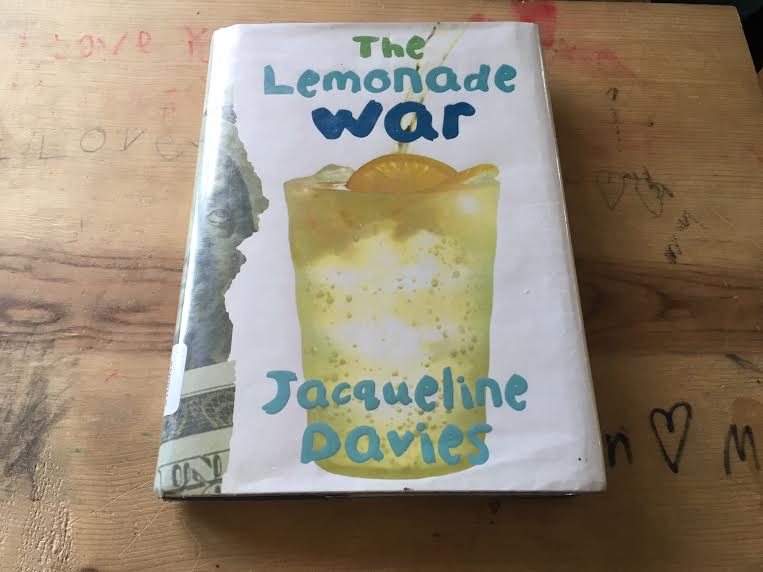
by Rachel Toalson | Books
If you’re not as entrenched in the kid-lit world as I am, you might be wondering what early readers are. Early readers are a bridge between picture books and middle grade readers. They’re sometimes referred to as chapter books. There’s some debate as to what characteristics these books have, but here’s how I usually distinguish them: early readers are closer to picture books with not a whole lot of text but more than what would be found in a picture book. Chapter books sometimes have pictures and sometimes don’t.
Jaden Toussaint, the Greatest Episode 3: The Muffin Wars, by Marti Dumas, definitely fell into the early reader category for me, with charming illustrations and simple language that an emerging reader would understand. This was the first of the Jaden Toussaint books that I read, and I was immediately hooked. Jaden has a great personality and is so fun to get to know throughout the book.
In Episode 3 of the Jaden Toussaint series, Jaden’s cousin, Muffin, is coming to visit. He’s excited, but the problem is that she’s just as awesome as he is—maybe even more so. He feels a little threatened by her awesomeness, actually. So he sets out to try to prove that he’s better at something than she is.
The Muffin Wars is full of humor, personality and wisdom. I think early readers will identify with Jaden in his quest to be the best at everything and in the lesson he ultimately learns.
The Lemonade War, by Jacqueline Davies, is a chapter book for readers a little farther along the reading spectrum than Dumas’ Jaden Toussaint series. The Lemonade War is actually a book I picked up because my 9-year-old read it in class last year, and he put all of Davies’ other books in this series on his summer reading list this year. So I wanted to find out what had drawn him so deeply into the series. And once I read The Lemonade War, it was easy to see.
The book is about a brother and sister duo, Jessie and Evan, who are out for the last days of their summer break. Evan is mad at Jessie for a reason she can’t understand. The book is told from both of their points of view, so we get to understand what she doesn’t—and the reason he’s mad is that Jessie is skipping the third grade and will be joining his fourth grade class once school starts. So now he’s afraid that she’s going to embarrass him—but not for the reasons you might think. And I’m not going to give away any spoilers.
So instead of joining together to sell lemonade, Jessie and Evan have a war—whoever makes the most money at a lemonade stand will get to take the other’s money. The book is full of all their efforts to create a successful lemonade stand.
I love that The Lemonade Wars was full of marketing and business advice that Jessie and Evan used for their entrepreneurial efforts. I also love that Jessie and Evan were entrepreneurial kids. You don’t see that a whole lot, and now I understand why my son wants to do a lemonade stand or an art stand or a selling-Minecraft-ideas stand every day. It’s encouraging for kids to read about other kids who are taking initiative and creating their own businesses.
What I loved most about The Lemonade Wars was the bond between Jessie and Evan, even though the whole premise of the novel is that they’re fighting. But even in their fighting, it’s clear to see that they care about one another. They have a competition that actually serves to bring out the creative side of both of them and helps them realize that even though they may have completely different abilities and strengths, they are still valuable to the world.
Here’s my favorite line from the book:
“On good days, Jessie’s mom called her persistent. On bad days, she told her she just didn’t know when enough was enough.”
I love this, because it sounds a whole lot like my 9-year-old.
I hope you enjoyed these book recommendations. Be sure to pick up a free book from my starter library and visit my recommends page to see some of my favorite books. If you have any books you recently read that you think I’d enjoy, contact me. I always enjoy adding to my list. Even if I never get through it all.







